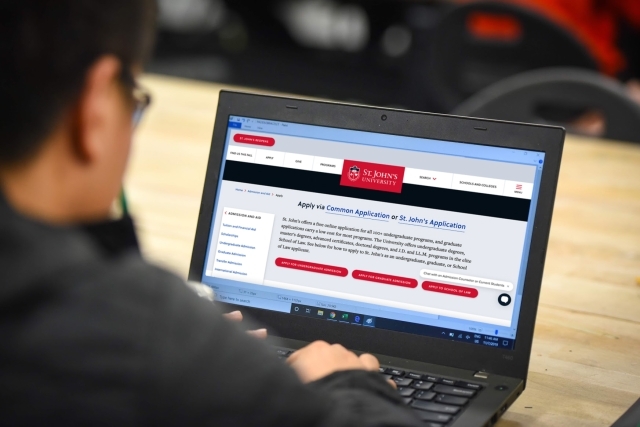
Applying to college can be stressful, even during “normal” times. Over the past year, the pandemic has added an unexpected layer of anxiety to this experience; high school schedules have been altered, standardized testing dates have been canceled, and plans to tour campuses have been disrupted. If you feel confused or overwhelmed, you can be certain that you are not alone.
“During my nephew’s stressful college search and application process, I told him to take a deep breath,” said Christine Perrault, St. John’s Assistant Director of Admission. “I reminded him that it will all work out, and at the end, he will wind up at the right school for him.”
Choosing a college is a major decision; this year, there are countless unknowns that have to be considered. By focusing on what you can control and heeding some sage advice, you can be confident that you will find the college or university that best fits your personality.
Here are some tips to help you through the process:
1. Tour a campus, either in person or online.
A traditional campus tour is still the best way to get a feel for a college campus, as it affords you the unique opportunity to explore campus grounds, buildings, and athletic facilities. St. John’s in-person campus tours allow for one student and one family member (two total) to discover our Queens, NY, and Staten Island, NY, campuses with one of our Student Ambassadors. If you cannot make it to campus, a virtual tour and information session is the next best thing. If you have specific questions about St. John’s, you can chat online with a student or a staff member.
2. Get to know your Admission Counselor.
An admission counselor is your connection to a university. They not only know an institution inside and out—they also are experts on the admission process. By connecting with your admission counselor, you get a better feel for each school under consideration, what each institution offers—and above all, if it is the right school for you.
3. Do not stress about standardized tests.
If your SAT or ACT was canceled, or you know that your results do not reflect your true college preparedness, you are not required to submit a score. St. John’s and many colleges have gone test optional in recent years, and in light of COVID-19, others have suspended their testing requirements as well. Standardized test scores are only part of a college application; if you choose not to submit a standardized score, it will not count against you on your application. If you do choose to submit one, keep in mind that it is just one facet of your application.
4. Make sure your essay reveals the real you.
Admission counselors receive thousands of applications from potential students. Your essay gives them a chance to get to know you as a person, not just as an applicant, so make sure that your essay conveys your personality. While some colleges may not require an essay, consider submitting one to those schools regardless, since in the absence of many school activities, it gives you the opportunity to provide some insight into your talents and interests.
Do not overedit or have too many people review it, as this can take away from the essence of your essay. Use the available 650 words wisely—and be sure not to exceed this limit, since anything over the word count does not fit in the allotted space within the Common Application.
5. Focus on what you have done—not what you have missed—due to the pandemic.
While COVID-19 forced the cancellation of many sports, clubs, events, and other activities, focus on those things you did accomplish over this past year. Whether in your essays or in interviews with admission counselors, steer the narrative to highlight things that you were able to do because of the pandemic, such as learning a new skill, becoming proficient in video conferencing, or helping out at home with younger siblings. Use this as an opportunity to explain what you discovered about yourself during a crisis and what or how you overcame challenges.
6. Fill out the FASFA
The Free Application for Federal Student Aid form, or FAFSA, is your conduit to federal money, including loans, work-study, and grants. Colleges and universities use the information in your FAFSA form to determine your eligibility for private scholarships from their own funds. Since certain forms of financial aid are offered on a first-come, first-serve basis, the sooner you fill out FAFSA, the more likely you are to receive grant money. At St. John’s University, 99 percent of undergraduates receive financial assistance.
7. Keep studying.
These are challenging times for everyone. Even though your final year in high school is not what you expected, it is still important to stay focused on your courses. Maintaining solid study habits not only helps you keep your grades up—it makes the transition to college an easier process.
8. Stay optimistic.
No one can say for certain when the world will return to normal or what the new normal will look like. However, by keeping an optimistic outlook on high school, home life, and the future, you will make better use of your time.
As has been said throughout the pandemic, “We are all in this together.” You are certainly not alone in feeling anxious about the college application process. Stay focused on the task at hand, and rest assured that you will find a college or university to call home for the next four years.
To apply to one of the more than 100 undergraduate programs offered by St. John’s, please visit our apply website.
